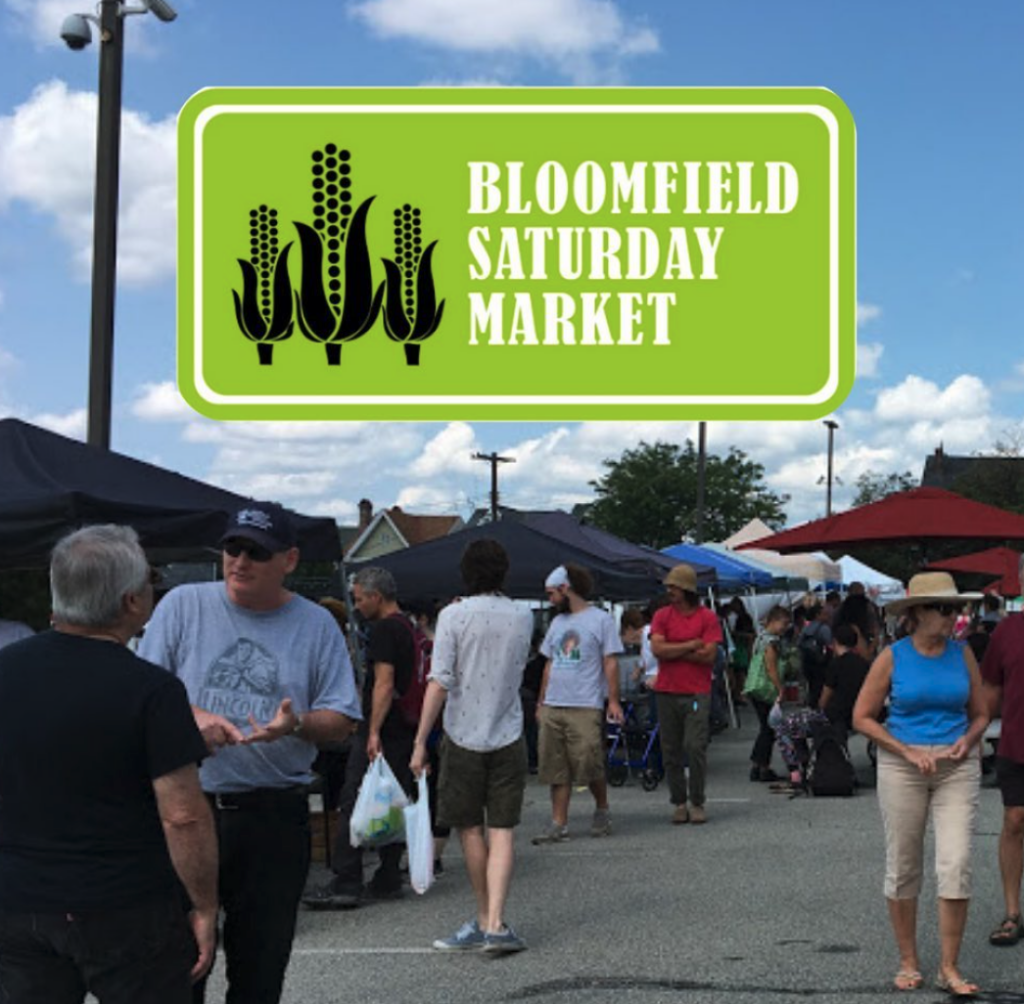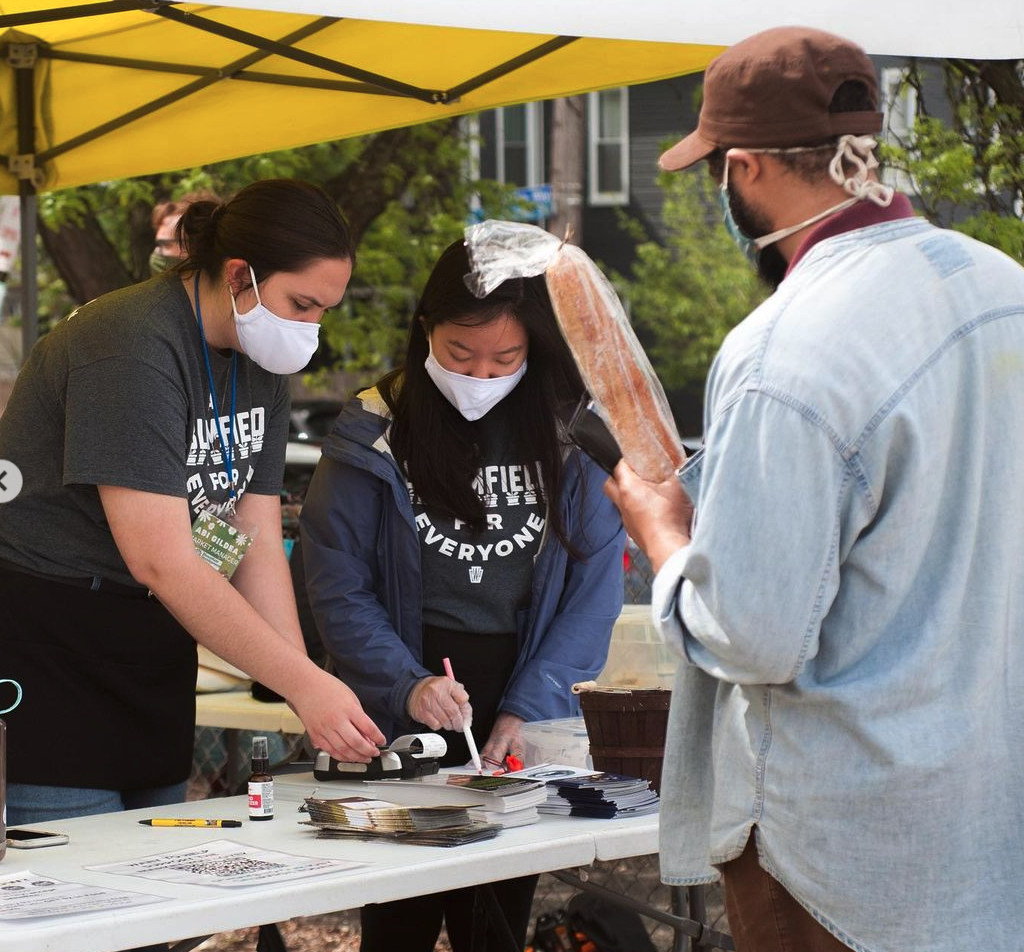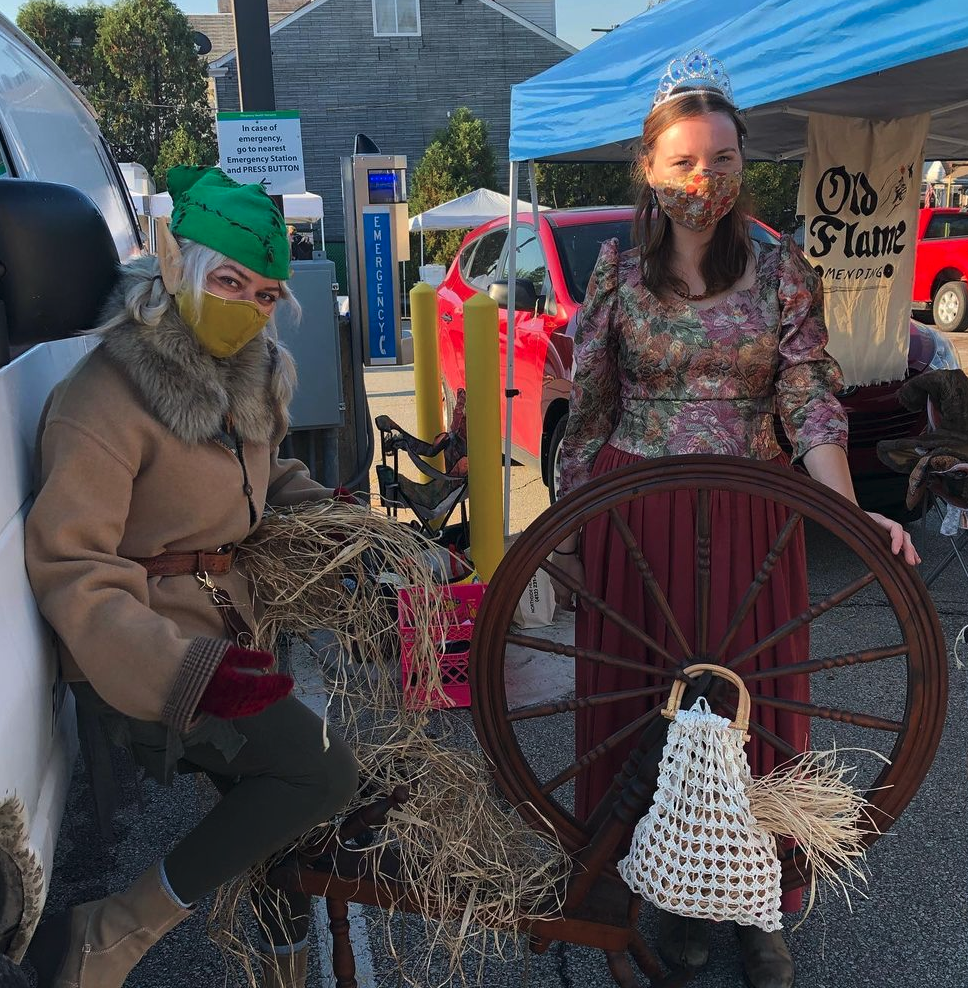Awesome Project: Bloomfield Saturday Market
Published January 14, 2021
On Saturday mornings, Abi Gildea makes her way to 50 50 Liberty Avenue in the heart of Pittsburgh’s Bloomfield neighborhood. Any other day of the week, her route would lead her to an empty parking lot. But on Saturdays, the area transforms into a bustling market filled with dozens and dozens of local vendors. From vegetables to prepared foods to home goods and everything in between, Bloomfield Saturday Market is a place for people to enjoy a taste of Pittsburgh. And Abi is the woman behind the market’s magic.
Dubbed Pittsburgh’s “Little Italy,” the neighborhood of Bloomfield is known for its walkable streets lined with independent grocers and small businesses, many of which have been around for decades. “There’s a lot of heritage here,” Abi says. “Grandchildren live here whose grandparents lived here; things like that.” In addition, the area has begun to attract a younger generation. “It’s somewhat affordable still for being as close to the city as it is, compared to a lot of the other neighborhoods in the East End. So it’s a really unique set of people.”
And a big part of Bloomfield’s character comes from how its residents show up for one another. In fact, a pattern of neighbors helping neighbors is deeply woven into the fabric of the community. In its early days, residents formed mutual aid groups to help immigrants adjust to life in America without losing their heritage. Today, the Bloomfield Development Corporation supports local small business districts, advocates for affordable housing, and works in other ways to foster an equitable and healthy community. One of their programs is the beloved Bloomfield Saturday Market.

As Program Coordinator, Abi’s main role is to manage the market. She took on the position in 2019, but her ties to Pittsburgh run much deeper. A native of the city, she’s seen her hometown go through lots of changes over the years. “In the ‘80s, ‘90s, and early 2000s, everyone moved to the suburbs, and the downtowns took a hit. And now we’re seeing everyone want to go back to the city.” Around 2010, the development started happening again. “At that time,” she says, “There wasn’t any reason to come [here].”
Bloomfield Development Corporation’s Executive Director and local resident Christina Howell wanted to change that. As Abi puts it, “She wanted there to be good news about Bloomfield.” So she poured time, energy, and lots of hard work into researching what makes a successful farmer’s market. A few years later, in 2014, the market launched.
At first, it was small (“really, really small,” says Abi), but it wasn’t long before it gained some serious traction. By 2018, the market was attracting thousands of visitors each Saturday. Today, it’s Pittsburgh’s largest and it plays an important role in the community’s present and its future: not only does the customer base directly support the market’s local vendors, but it brings new visitors and exposure to the neighborhood’s business district.
But in March 2020, when the COVID-19 crisis hit, everything changed. Suddenly, Abi and the rest of BDC’s staff were faced with challenges they hadn’t anticipated, and it quickly became clear that their initial goals for 2020 were no longer relevant. The city of Pittsburgh went into lockdown just a few days before their last winter market of the season, and BDC made the decision to cancel the market. “We felt we couldn’t host the market safely with the tight turnaround,” Abi says.
The closure had a devastating impact on many members of the community, including the farmers and vendors who relied on the income and the customers who relied on the food. “Everything farmers markets have come to be known and loved for–a place to see friends and neighbors, stumbling on delicious new food, creating community in a setting that is accessible to everyone–[was] gone,” Abi says.
In the early days of the lockdown, city officials instituted new policies to try to mitigate the worsening health crisis. The city-run markets would be allowed to continue operations, but only with drive-thru and online ordering models. Abi knew that this wouldn’t work for many customers. “Choosing that market model would exclude an extremely large portion of shoppers,” she says, “[including] folks who don’t have a car, internet access, a credit card, and those who shop with SNAP/EBT at the market.”
But Abi also knew that markets were essential for food accessibility in her community and that it was important to find a way to continue hosting them in person. As she puts it, “We are very much at play in our food system. We [knew we] should acknowledge that and participate in that.” So she got to work researching how other markets around the country were responding to the pandemic, which led her to develop customer, vendor, and staff guidelines for in-person shopping that would help ensure everyone’s health and safety. They had to change Saturday Market’s site layout, too, so that people could move safely within the space. “We basically had to make a new market,” she says.
Christina, BDC’s Executive Director, then used those guidelines to advocate to the city of Pittsburgh to allow markets to resume in-person operations. She was successful, and markets were once again open for shoppers to attend. “[Our advocacy] led the conversation with the city so that they understood that markets are not special events, but vital food access points,” Abi says.

But the work was far from over. Even after they opened back up, Abi and her team had to continually adapt. One major challenge they faced was grappling with the high monetary costs of re-opening. The safety of their customers, vendors, and staff was always their top priority, and that meant taking on a lot of unforeseen expenses–things like cleaning supplies, hazard pay for employees, and safety equipment–that were necessary for the market to operate.
One of the ways they solved this problem was by turning to ioby for a crowdfunding campaign. As a small team embarking on their first-ever crowdfunding journey, Abi says she chose to use ioby’s platform because she knew what we stand for–literally, as well as in our values–is aligned with the market’s mission. “I think for what we were trying to do and the type of organization we are, it just worked, because it’s all about helping out your neighbor. And that was exactly what we were trying to do. We were just making sure this market happened, especially seeing the threat to our national food system.”
She says having ioby to support her throughout the fundraising process was extremely helpful. “Any time I had questions, [anyone I was connected with at ioby] was always so willing to get back to me and make sure all of the questions I had were answered,” she adds. “That was really rewarding because I feel like me being a one-woman show, having resources and connections and staff ready to answer emails and phone calls makes [the fundraising process] feel way less of a burden.”

Thanks to Abi’s hard work, their campaign was a resounding success: they met their fundraising goal of over $5,000 in just a few months’ time. “Seeing people give to the market via the ioby campaign, it was like, okay, people do want to give. It’s something people really are interested in.” With the money raised, they were able to purchase health and safety supplies, as well as help vendors set up online ordering systems to meet the growing demand for contactless transactions.
The result? People felt safe coming to the market–and have continued to do so. The future looks bright for Bloomfield Saturday Market, and Abi is currently gearing up for a busy season. They recently held their first winter market, which she says was comparable to a summer market in terms of attendance. “A normal winter market attracts maybe 400 people–on a good day. And [last week,] we had close to a thousand.”
On Saturdays, when Abi is at the market, she often chats with visitors to learn more about their experiences as customers. She does this so that she can make sure the market is responsive to folks’ needs and is able to serve the community as best as it can. And although this difficult year brought many unprecedented challenges, thanks to Abi’s leadership, the market is a manifestation of what Bloomfield neighbors have always done for one another: they show up, no matter what. “When I talked to [the customers,’” Abi remembers, “they would say, This is what made me feel normal. Or they would say, I don’t do anything other than come to this market. And it just allows me to remember that I’m not alone.”
Check out ioby’s 2020 Giving Report for more awesome stories of positive change.
